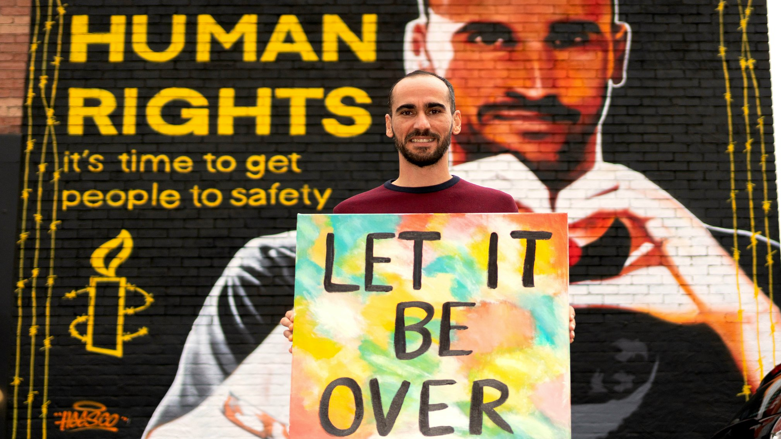2 former Kurdish asylum seekers enter Archibald prize

ERBIL (Kurdistan 24) – Kurdish musician Moz Azimitabar and former Manus Island detainee Farhad Bandesh are entering their self-portraits in the prestigious 2022 Archibald Prize after spending over seven years in Australian detention, the Guardian reported on Thursday
Both men were former asylum seekers to Australia.
During his years in detention, Azimitabar had his donated art materials routinely confiscated from him.
"I decided to paint a self-portrait with toothbrushes, because for 8 years I did not have art materials," he recalled to Amnesty Australia. "In detention, I used toothbrushes and coffee."
Azimitabar's self-portrait is called KNS088.
"I have painted a self portrait with toothbrushes, coffee and some acrylic paints on a canvas 195 cm by 180 cm to submit for the Archibald Prize this year," he tweeted.
I have painted a self portrait with toothbrushes, coffee and some acrylic paints on a canvas 195 cm by 180 cm to submit for the Archibald Prize this year.
— Moz (Mostafa Azimitabar) (@AzimiMoz) March 23, 2022
For 8 years in detention I was a number,
For 8 years I was called KNS088.https://t.co/Uj4g4TnCFO
Title : KNS088 pic.twitter.com/qj695zX3CF
"For 8 years in detention I was a number, for 8 years I was called KNS088," he added.
The Guardian also reported that after almost eight years in detention, including 14 months locked up in two Melbourne hotels after his transfer to Australia, Azimitabar finally secured his freedom in early 2021.
The portraits were completed in the studio of Angus McDonald, a six-time Archibald Prize finalist, who has built a personal friendship with both men, Amnesty said.
"To be with them now as free men, and see them create these incredible paintings is a genuine privilege," he said.
Today i submitted my self portrait painting into Archibald priz, @ArtGalleryofNSW
— Farhad Bandesh (@FarhadBandesh) March 31, 2022
I'm sharing some of my story on this painting.i am with a smile this means resistance!#AtgalryofNSW #gameover @amnestyOz https://t.co/WC0Czbi1C2
Bandesh's art also expressed his Kurdish identity. He was released in 2020 after more than seven years in detention.
Read More: Kurdish refugee released in Australia after more than seven years in detention
"The red, yellow and green on my face are the colors of my land [the Kurdistan flag]," Bandesh told the Guardian. "The blue is for the ocean I crossed to come to Australia; it says safety and freedom."
The Australian government in the past has sent thousands of refugees to offshore processing and detention centers in Papua New Guinea and Nauru to deter people from entering Australia via boat. This has led to criticism from human rights advocates.
In October 2021, the Australian government cut all support to the 124 remaining men in Papua New Guinea.
